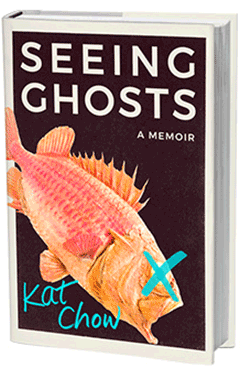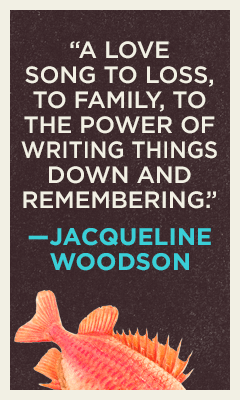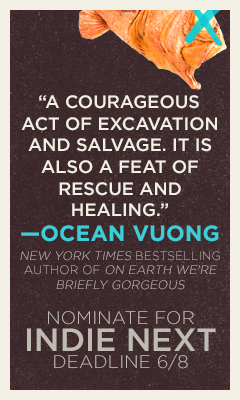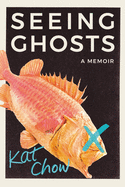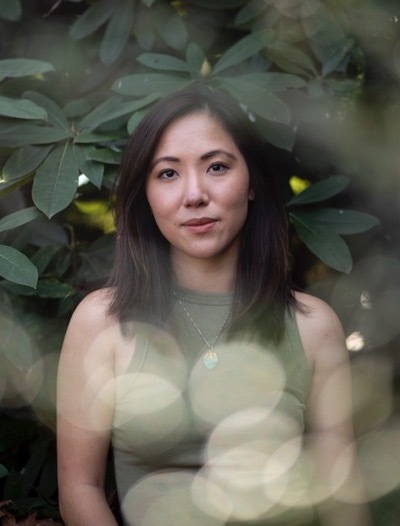Seeing Ghosts
by Kat Chow
So much of debut author Kat Chow's magnificent memoir, Seeing Ghosts, is about absence--the yawning loss of something that was once there, that should still be here. In carefully arranged pieces, anecdotes laid together like mosaic tiles, Chow unleashes the power of her own grief after the loss of her mother.
Florence, once known as Bo Moi, was a sharply funny and fascinating woman, and Chow draws her on the page with such tenderness that readers have little choice but to love her, too, despite the ensuing agony of her death. We watch her alongside her children, Steph, Caroline and Kat, as she drops emblematic memories into their lives, leaving a trail of breadcrumbs for them to trace back when she eventually must leave them. One such breadcrumb is a visceral moment in which Florence jokes that, once she dies, she'd like her daughters to stuff her, so that her taxidermied body might watch over her little ones for all time. The vision haunts Chow for decades to come, and it provides the initial scaffolding for this book.
But Seeing Ghosts explores absence far beyond the loss of Florence to a horrible cancer. Chow excavates her own history with ruthless honesty and deep respect. Absence appears again and again, in the form of her family's continuous financial debt; the silence between Chow and her father; the answers she still feels she owes her mother; the ancestral connections in Cuba and China that have grown faded and confused with time; the vast legacy of Asian American men and women lost to a corrupt system. Chow writes about her brother, who died as an infant. She writes about Yung Wing, one of the first Chinese Americans to graduate from Yale. She writes about her father's arrest and the subsequent bail payments. She writes about Neva Dorsa, a woman who built a window into her husband's coffin so she could look in and see his corpse. The brilliance of Seeing Ghosts is that these fragments all tie together naturally--readers never pause to ask why Chow is bringing them under one roof, for they've learned to trust she'll reveal the connections in time.
It would be easy to characterize Chow's book as yet another grief memoir, another tale of how to wade through the years of loneliness and struggle after the loss of a parent. That would be selling the story short, not to mention failing to grasp its scope. Seeing Ghosts is about Florence, yes, but also about everything Florence's family means--a patchwork quilt of Chinese Americans making sense of the amorphous American Dream. Chow does this most skillfully in scenes with her father, a man who struggles with happiness, whatever that means, yet seems desperately to want. He wants a restaurant, so he opens Lotus Garden, which shutters due to financial troubles. He wants to make money, so he becomes a landlord for a set of buildings in varying degrees of disrepair. He wants a fish on his wall, so he attempts to preserve and taxidermy one himself. He wants to find his father's remains, so he travels to Cuba to sort through seemingly endless boxes of bones. Yet he either cannot or does not want to name the systemic injustices set against him, and though this frustrates Chow as she interviews him, it also fascinates her. So she keeps pulling on the thread. And pulling. And pulling.
This resolve to tackle the frustrating truth of her history--and, by proxy, Asian American history--is what makes Seeing Ghosts sing. Readers don't need to delve through Chow's biography to know she's a journalist, one who formerly worked with NPR's popular podcast Code Switch. She brings a reporter's keen eye to her own lineage, and never tries to protect herself. She reveals her own failures and flaws just as earnestly as her family's, and that steadiness in the face of numerous identity crises gives Seeing Ghosts a surge of power.
Chow's memoir is not an easy book, which doesn't mean it's not an easy read. The prose is tight and lovely, one page and one fragment intertwining with the next. The experience of reading it is enjoyable, despite the subject matter. But that is where Chow's journalistic skill triumphs: she feeds readers an impossibly challenging topic through beautifully seasoned bites. The result is that readers turn the last page having swallowed a delicious meal, only to realize there is so much more for them to digest. Seeing Ghosts is a book that will leave readers thinking, mourning, probing the absences and injustices of American life, equally haunted and soothed by ghosts. --Lauren Puckett



